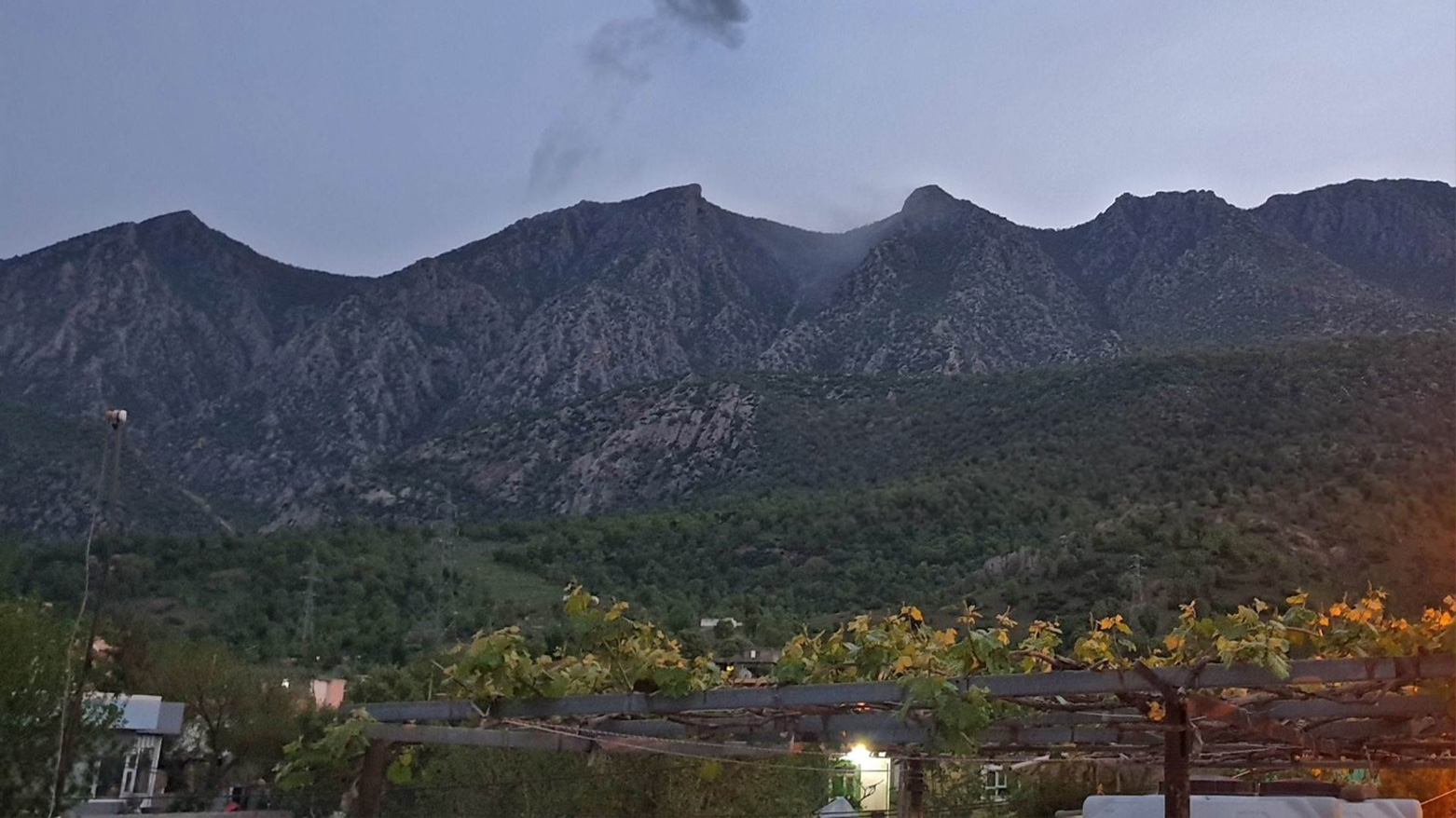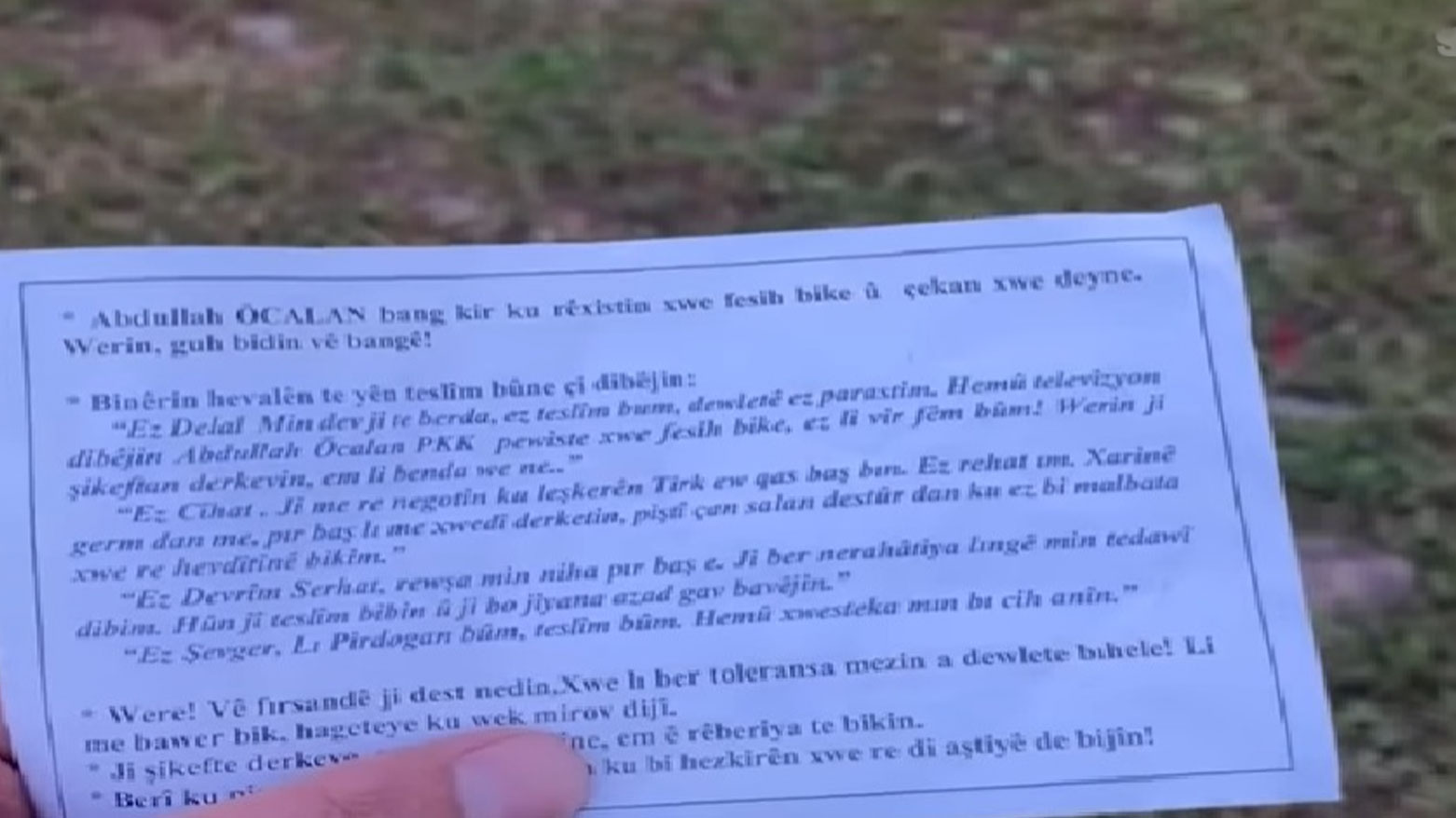Turkish Warplanes Drop Letters Urging PKK to Disarm, Echoing Öcalan’s Peace Appeal
Local residents in Amedi said Turkish aircraft dropped letters over Matin and Gara mountains, urging PKK fighters to disarm in line with Öcalan’s call. The bilingual messages promised government support for those who comply.

By Kamaran Aziz
ERBIL (Kurdistan24) – In a dramatic and highly symbolic move, Turkish warplanes this morning dropped leaflets over mountainous areas of Duhok Governorate, urging members of the Kurdistan Workers’ Party (PKK)—a group designated as a terrorist organization by Turkey, the United States, and the European Union— to surrender and abandon armed struggle in accordance with recent peace calls made by their imprisoned leader, Abdullah Öcalan.
According to local residents in the Amedi district, Turkish military aircraft dropped the letters over the Matin and Gara mountain ranges—areas known for the presence of PKK fighters. Witnesses confirmed that the letters, printed in both Turkish and Kurdish, directly appealed to PKK members to heed Öcalan’s call and disarm, promising assistance from the Turkish government for those who comply.
The contents of the letters were notably personal and emotive. They featured testimonials from surrendered PKK fighters who spoke positively about their treatment by Turkish authorities. The leaflets reiterated Öcalan’s peace proposal, stating: “Abdullah Öcalan called for the organization to dissolve itself and lay down its weapons. Come, listen to this call.”
One message read: “I am Delal. I left you, I surrendered, the state protected me... Come out of the caves, we are waiting for you.” Another stated: “I am Cihat – They didn’t tell us that Turkish soldiers were so good... They gave us warm food... after years they allowed me to meet with my family.”
Further testimonies followed in the same tone. “I am Devrim Serhat, my situation is very good now. I am receiving treatment for my leg discomfort. You should surrender too, and take steps towards a free life.”
The letter concluded with a powerful and urgent appeal: “Come! Don’t miss this opportunity... Trust us, you deserve to live like a human. Come out of the cave...”

“The letters asked the PKK to listen to the message of their leader Abdullah Öcalan, lay down their arms, and surrender,” one villager told reporters. “They even said the Turkish state will help them if they surrender.”
This operation comes just weeks after a renewed peace appeal was publicly delivered by the Imrali delegation, a group of intermediaries authorized to communicate with Öcalan. On Thursday, February 27, 2025, the delegation held a press conference following their latest meeting with the imprisoned PKK leader, during which they read out a powerful message in both Kurdish and Turkish.
Ahmet Türk, the respected Kurdish politician and dismissed mayor of Mardin, read Öcalan’s words in Kurdish: “The PKK was established when the path to democracy was closed, but now it is necessary to advance the language of peace and democracy.” In his statement, Öcalan stressed the need for the PKK to disarm and convene a congress to initiate a process of self-dissolution, declaring that he personally guarantees the peace effort and assumes full responsibility for this critical shift.
The recent aerial distribution of leaflets is being interpreted as a tangible extension of Öcalan’s peace proposal, which has gained renewed momentum in Turkish political discourse. Pervin Buldan, another member of the Imrali delegation, confirmed yesterday that they had visited Öcalan for a fourth time, stating that “work on the peace process is continuing.”
Buldan also conveyed a personal message from Öcalan to fellow peace advocate Sırrı Süreyya Önder, wishing him a speedy recovery and praising his past efforts. “He is a dear person to us because he works for peace,” Öcalan wrote, acknowledging their collaborative work in past peace initiatives.
The move by the Turkish government to disseminate Öcalan’s message from the air—particularly in areas under PKK control—underscores a strategic attempt to weaken insurgent resolve while projecting the image of a state willing to pursue reconciliation. Yet, the effectiveness of such overtures remains uncertain amid deep-seated distrust, a fractured Kurdish political landscape, and ongoing clashes.
Analysts suggest that this development, though largely symbolic at present, could signal the potential for reviving formal peace talks if met with reciprocal gestures by the PKK. Whether this appeal translates into meaningful dialogue or disarmament remains to be seen, but for the moment, the winds over Duhok carried not bombs, but words—words calling for peace after decades of bloodshed.